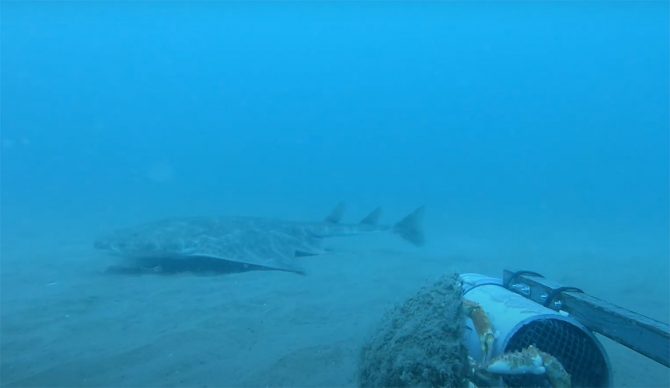
Fleeting and vanishingly rare, the angel shark is almost never seen. Image: The Wildlife Trust of South & West Wales
![]()
The angel shark is one of the world’s rarest shark species. It is listed as critically endangered by the International Union for Conservation of Nature (IUCN), and we almost never see them. But thanks to the miracles of modern technology, researchers got a very good look at one in Cardigan Bay, Wales.
“Historically, the angel shark’s range extended from Scandinavia to northwestern Africa, including the Mediterranean and the Black Sea,” the ICUN writes. “However, it has now vanished from some areas, and is extremely uncommon throughout most of the remainder of its range.”
Angel sharks live mainly on the seafloor, camouflaging themselves extraordinarily well in order to escape predators and ambush their prey. Feeding mostly off of flatfish, crustaceans, and mollusks, they are often caught in trawl nets, which have devastating consequences to all manner of sea life.
“Although not particularly sought after by fisheries, the angel shark’s habit of lying on the sea bottom makes it particularly vulnerable to by-catch in trawl fisheries,” the ICUN continues. “Over the last 50 years, trawling activity has increased, and as a result the population has declined dramatically, and has even been declared extinct in the North Sea.”
That’s why, when researchers from The Wildlife Trust of South & West Wales (WTSWW) looked at the footage from a program called the Dolphin Diet Detectives project, they were so surprised to see an angel shark.
“We were thrilled to record an angel shark in Cardigan Bay, a rare and exciting encounter,” said Dr Sarah Perry, Marine Conservation and Research Manager at WTSWW. “Before this project started, angel sharks hadn’t been captured on film in Cardigan Bay since 2021. This sighting comes at a crucial time, as the Senedd and UK Government discuss a ban on bottom trawling in Marine Protected Areas. Our Dolphin Diet Detectives project, funded by the Welsh Government through the Nature Networks Fund, uses underwater cameras to reveal the incredible diversity of life on the seabed. These findings highlight the urgent need to protect these fragile habitats from damaging activities like bottom trawling.”

